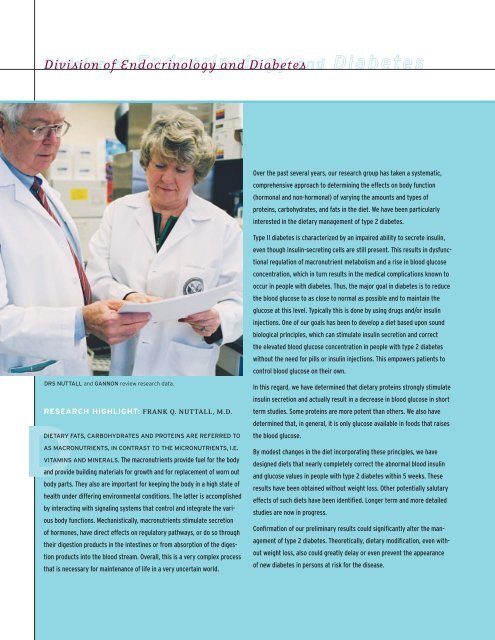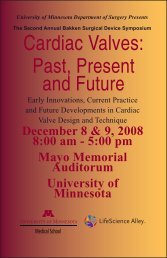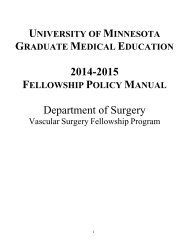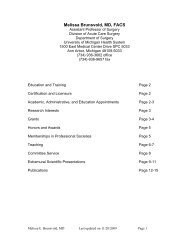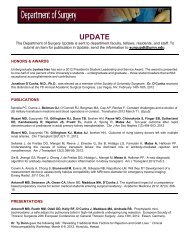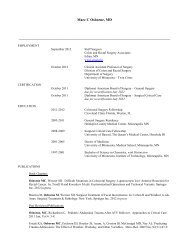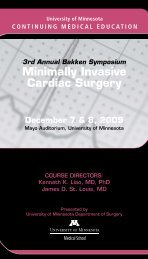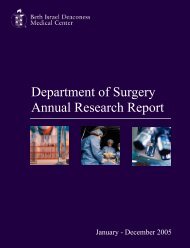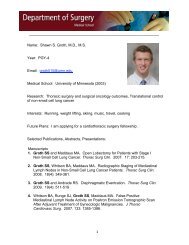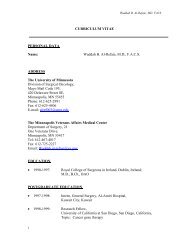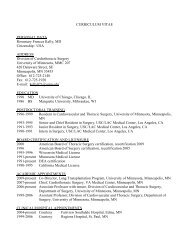pital is highly individual inits patient mix and areas<strong>of</strong> expertise. Special effortsare made to include activitiesrelating to pediatric andreproductive endocrinology.The training program utilizesthe <strong>University</strong>’s General ClinicalResearch Center (GCRC)for its clinical research.The GCRC has been fundedby the NIH for more than35 years. The CRC activelysupports studies <strong>of</strong> recipients<strong>of</strong> pancreas and islet transplantation,metabolic effects<strong>of</strong> dietary carbohydrates,and immunogenetics <strong>of</strong>diabetic families.Other Teaching Activitiesn A teaching conference inbasic clinical endocrinologyfor medical students, housestaff, and first-year fellowsn Divisional grand rounds andbers <strong>of</strong> the division participatein multiple NIH fundedmulti-center trials, many <strong>of</strong>which are located at the <strong>University</strong><strong>of</strong> <strong>Minnesota</strong>. Someexamples include the LookAHEAD trial, the ACCORDtrial, the EDIC trial, and theBARI 2D trial. In addition, thedivision director participatesas a core director in the <strong>Minnesota</strong>Obesity Center, whichis under the co-direction <strong>of</strong>Dr. Billington, a member <strong>of</strong>the Division <strong>of</strong> Endocrinology.Some <strong>of</strong> the basic scienceresearch programs includeinvestigation into the regulation<strong>of</strong> fatty acid synthesisby novel proteins; the role <strong>of</strong>thyroid hormone in the regulation<strong>of</strong> brain development;the identification <strong>of</strong> brainpathways responsible fornormal and abnormal feedingbehavior; lipoprotein polymorphismsand cardiovasculardisease; immunobiology <strong>of</strong>islet transplantation; and pancreaticislet precursors fromembryonic stem cells. Clinicallybased research studiesinclude the regulation <strong>of</strong> glucosetransport into the brainin diabetes; the role <strong>of</strong> obesityin the development <strong>of</strong> diabeticassociated renal disease; therole <strong>of</strong> diet in the regulation<strong>of</strong> blood sugar levels; the role<strong>of</strong> renin-angiotensin systemin diabetic complications; andthe regulation <strong>of</strong> blood lipidsby oral hypoglycemic agents.FacultyPr<strong>of</strong>essorsJohn Bantle, M.D.Jose Barbosa, M.D. (Emeritus)Charles Billington, M.D. (VAMC)Frederick Goetz, M.D.Angeliki Georgopoulos, M.D. (VAMC)John MacIndoe, II, M.D. (Regions)Cary Mariash, M.D. (Director)Catherine Niewoehner, M.D. (VAMC)Frank Nuttall, M.D., Ph.D. (VAMC)Jack Oppenheimer, M.D. (Emeritus)Elizabeth Seaquist, M.D.Associate Pr<strong>of</strong>essorsLynn Burmeister, M.D.Mary Gannon, Ph.D. (VAMC)Alex Lange, M.D.J. Bruce Redmon, M.D.Assistant Pr<strong>of</strong>essorsPuneet Arora, M.D. (Regions)Nacide Ercan-Fang, M.D. (VAMC)Meri Firpo, Ph.D.Kathleen Hall, M.D. (HCMC)Guilford Hartley, M.D. (HCMC, Adjunct)Bernhard Hering, M.D.Sidney Jones, M.D. (HCMC)Susan Raatz, Ph.D., R.D.Crispin Semakula, M.D. (HCMC)Shalamar Sibley, M.D.David Stuart, M.D. (HCMC)43research seminars given byfaculty members or guestsn Journal clubs and data conferenceswithin individuallaboratoriesn An introductory coursedesigned to teach first-yearfellows research methodologiesand technologiesResearch ActivitiesThe Endocrinology and DiabetesDivision continues to excelin its research efforts. Investigatorsat the <strong>University</strong>,HCMC, and VA Medical Centerare nationally funded. Mem-Basic science research training occursunder the direction <strong>of</strong> Dr. Mariash in astate-<strong>of</strong>-the-art laboratory in the newlyconstructed Microbiology and CellularBiology building.
Division <strong>of</strong> Endocrinology and DiabetesOver the past several years, our research group has taken a systematic,comprehensive approach to determining the effects on body function(hormonal and non-hormonal) <strong>of</strong> varying the amounts and types <strong>of</strong>proteins, carbohydrates, and fats in the diet. We have been particularlyinterested in the dietary management <strong>of</strong> type 2 diabetes.Type II diabetes is characterized by an impaired ability to secrete insulin,even though insulin-secreting cells are still present. This results in dysfunctionalregulation <strong>of</strong> macronutrient metabolism and a rise in blood glucoseconcentration, which in turn results in the medical complications known tooccur in people with diabetes. Thus, the major goal in diabetes is to reducethe blood glucose to as close to normal as possible and to maintain theglucose at this level. Typically this is done by using drugs and/or insulininjections. One <strong>of</strong> our goals has been to develop a diet based upon soundbiological principles, which can stimulate insulin secretion and correctthe elevated blood glucose concentration in people with type 2 diabeteswithout the need for pills or insulin injections. This empowers patients tocontrol blood glucose on their own.Drs Nuttall and Gannon review research data.Research Highlight: frank Q. nuttall, M.D.DDietary fats, carbohydrates and proteins are referred toas macronutrients, in contrast to the micronutrients, i.e.vitamins and minerals. The macronutrients provide fuel for the bodyand provide building materials for growth and for replacement <strong>of</strong> worn outbody parts. They also are important for keeping the body in a high state <strong>of</strong>health under differing environmental conditions. The latter is accomplishedby interacting with signaling systems that control and integrate the variousbody functions. Mechanistically, macronutrients stimulate secretion<strong>of</strong> hormones, have direct effects on regulatory pathways, or do so throughtheir digestion products in the intestines or from absorption <strong>of</strong> the digestionproducts into the blood stream. Overall, this is a very complex processthat is necessary for maintenance <strong>of</strong> life in a very uncertain world.In this regard, we have determined that dietary proteins strongly stimulateinsulin secretion and actually result in a decrease in blood glucose in shortterm studies. Some proteins are more potent than others. We also havedetermined that, in general, it is only glucose available in foods that raisesthe blood glucose.By modest changes in the diet incorporating these principles, we havedesigned diets that nearly completely correct the abnormal blood insulinand glucose values in people with type 2 diabetes within 5 weeks. Theseresults have been obtained without weight loss. Other potentially salutaryeffects <strong>of</strong> such diets have been identified. Longer term and more detailedstudies are now in progress.Confirmation <strong>of</strong> our preliminary results could significantly alter the management<strong>of</strong> type 2 diabetes. Theoretically, dietary modification, even withoutweight loss, also could greatly delay or even prevent the appearance<strong>of</strong> new diabetes in persons at risk for the disease.
- Page 2 and 3: The University of Minnesota Departm
- Page 4 and 5: of excellence and nationalprominenc
- Page 6 and 7: The Division Heads haveagreed that
- Page 8 and 9: Department of Medicine Educationfle
- Page 10 and 11: Bradley benson, M.D.Medicine-Pediat
- Page 13 and 14: UMPhysicians: Clinical Programsimpr
- Page 15: Daniel Weisdorf, M.D.BMT Program Di
- Page 20 and 21: Oncology Clinic, ImagingCenter, and
- Page 22 and 23: n Blue Cross and Blue Shieldof Minn
- Page 24 and 25: Affiliated Campus Reports23
- Page 26 and 27: FacultyThe core faculty is growingr
- Page 28 and 29: esidents and fulfilling itsbring in
- Page 30 and 31: tional cardiology. Dr. CrispinSemak
- Page 32 and 33: ClinicalOur outpatient services hav
- Page 34 and 35: VA Medical CenterThe Medicine Servi
- Page 36 and 37: Research funding in medicineservice
- Page 38 and 39: Divisions, Department of Medicine
- Page 40 and 41: in its earliest stages, beforeconve
- Page 42 and 43: with heart failure and otherforms o
- Page 46 and 47: Division of Gastroenterology, Hepat
- Page 48 and 49: From Left to Right: John R.Lake, MD
- Page 50 and 51: FacultyProfessorsHanna E. Bloomfiel
- Page 52 and 53: andomized, controlled trialof TU 02
- Page 54 and 55: Division of Geneticsactive collabor
- Page 56 and 57: Division of Hematology, Oncology, a
- Page 58 and 59: This UMPhysicians-ownedclinic house
- Page 60 and 61: Division of Infectious Diseases and
- Page 62 and 63: opment of invasive clinicalextraint
- Page 64 and 65: sleep medicine. Regions Hospitalpro
- Page 66 and 67: the clinical services to newsubgrou
- Page 68 and 69: Division of Renal Diseases and Hype
- Page 70 and 71: Faculty Honors andAwards for 2005in
- Page 72 and 73: Full-time rheumatology clinicalfacu
- Page 74 and 75: in her lab rely on family-basedgene
- Page 76 and 77: Faculty Recognition: Fall 2005New D


